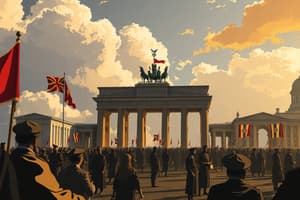Podcast
Questions and Answers
Which country aimed to establish a global power through colonization in Africa during the Berlin Conference?
Which country aimed to establish a global power through colonization in Africa during the Berlin Conference?
- Belgium (correct)
- Portugal
- Germany
- France
What primary factor limited the extent of Portugal's expansion into the interior of Africa?
What primary factor limited the extent of Portugal's expansion into the interior of Africa?
- Concerns about disease (correct)
- Competition from other European powers
- Lack of resources
- Fear of retaliation from African tribes
Which of the following was NOT a driving force behind European imperialism in Africa during the Berlin Conference?
Which of the following was NOT a driving force behind European imperialism in Africa during the Berlin Conference?
- Missionary activity
- Competition amongst European nations
- Spread of democracy and freedom (correct)
- Desire for valuable resources
Which European power primarily focused on gaining territories in and above the equator, primarily to avoid competition with England?
Which European power primarily focused on gaining territories in and above the equator, primarily to avoid competition with England?
What was the primary outcome of the Berlin Conference?
What was the primary outcome of the Berlin Conference?
Flashcards
Berlin Conference
Berlin Conference
A meeting (1884-1885) where European nations established rules for dividing Africa.
Portugal's Focus
Portugal's Focus
Initially focused on coastal trade ports in Africa, limited by disease concerns.
King Leopold II's Goals
King Leopold II's Goals
Sought to make Belgium powerful through colonization of the Congo, including cruel treatment of locals.
Motivations for Imperialism
Motivations for Imperialism
Signup and view all the flashcards
Consequences of Partitioning
Consequences of Partitioning
Signup and view all the flashcards
Study Notes
Imperialism in Africa: Berlin Conference (1884)
- Nations divided Africa among Western powers, aiming for peaceful resource distribution.
- Portugal was the first European nation to explore Africa, focusing on coastal trading ports.
- Portugal's interest in Africa was mainly for trading ports and resources.
- Belgium's King Leopold II was the sole owner of the Congo Free State.
- King Leopold's reign was marked by cruel treatment and exploitation of Congolese people.
- King Leopold II intended to convert the Congolese people to Christianity.
- Congo presented a challenging environment to King Leopold II.
- France aimed to acquire land in Africa, particularly areas above the equator.
- France's expansion was sometimes limited by the challenging environments of Africa.
- France was competing with England for territorial gains in Africa.
- Acquired land in Africa was primarily in the desert regions.
Studying That Suits You
Use AI to generate personalized quizzes and flashcards to suit your learning preferences.




